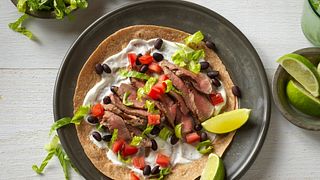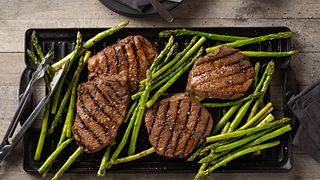Beef Farmers and Ranchers Ensure Dietary Guidelines Advisory Committee Considers the Science Supporting Beef’s Role in a Healthy Diet
June 16, 2020
Over the last 13 months, the National Cattlemen’s Beef Association (NCBA), a contractor to the Beef Checkoff, has submitted 21 sets of public comments and more than 100 research studies in support of beef’s role in a healthy diet to the 2020 – 2025 Dietary Guidelines for Americans Advisory Committee (DGAC).
“Beef is part of a healthy diet for most Americans, and a large body of research supports the flexibility to choose lean beef more often as an important source of high-quality protein and nutrients during all life stages, from birth to older adults,” said Shalene McNeill, Ph.D., R.D., executive director of nutrition research for the National Cattlemen’s Beef Association, a contractor to the Beef Checkoff. “We believe it’s imperative that this research is reviewed and considered as part of the DGA process.”
The DGAC is comprised of 20 health and nutrition experts and is responsible for developing recommendations to inform the U.S. Department of Agriculture (USDA) and the U.S. Department of Health and Human Services (HHS) as they develop the updated Dietary Guidelines for Americans (DGAs), which are updated every five years. The DGAs are designed to provide Americans with a roadmap for healthy eating. They are the foundation for federal nutrition programs, along with school, military, hospital and nursing home menus, and the basis for many expert nutrition recommendations. The government has encouraged public participation throughout the DGAs process.
Beef supports health at every life stage, and the 21 sets of comments submitted to the DGAC by NCBA on behalf of the Beef Checkoff reviewed the scientific evidence on the following topics, among others:
- Beef’s critical role in growth and development, especially as a high-quality source of iron for older infants, women and girls.
- The large body of high-quality evidence consistently showing that lean beef supports heart health as part of a healthy diet.
- The important role beef plays as a source of high-quality protein and essential nutrition for the aging population.
- Dispelling the myth that Americans are overconsuming red meat, when in fact, Americans, on average, eat less than two ounces of beef each day1, which is in line with current DGA recommendations.
- Best scientific practices for evaluating beef-related research, including accurate meat definitions. Research reinforcing the importance of flexibility in choosing beef in a variety of healthy dietary patterns, including those low in carbohydrates and high in protein.
Recognizing that the forthcoming 2020 – 2025 DGAs will be the first set of guidelines to include recommendations for infants and young children from birth to 24-months of age, NCBA also submitted comments about the critical role of beef in growth and development. Beef is especially important as a high-quality source or iron for pregnant woman, infants, adolescent girls and women of childbearing age.
Included in the 21 sets of comments are numerous gold-standard Randomized Control Trial research studies reinforcing beef as an important source of high-quality protein for Americans of all ages. This includes Beef Checkoff funded research demonstrating how lean beef can be the protein of choice in many healthy dietary patterns, including the popular Dietary Approach to Stop Hypertension (DASH) diet and Mediterranean Diet. Research was also submitted showing the benefits of low-carbohydrate and higher protein diets, like the Beef Wise study that found lean beef, as part of a healthy and higher-protein diet, can help people lose weight while maintaining muscle mass and heart health.
One of the most recent studies contributing to the body of evidence supporting beef’s role in a healthy diet was published in the Journal of Nutrition in May. This research was conducted at Indiana University and found that people can have flexibility to include about six ounces of lean, fresh beef to daily healthy diets - replacing these calories with those from carbs - without increasing heart disease or diabetes risks.
Beef farmers and ranchers have a long history of supporting nutrition research with leading scientists at universities and research institutions across the country to better understand beef’s role in health. As traditional sources of research funding, such as government and academic grants, are becoming increasingly limited, farmer- and rancher-supported research helps fill gaps and ensures the body of nutrition knowledge continues to grow.
The DGAC will share its draft conclusions during a Draft Advisory Report Meeting on June 17. The final DGAC report will be released in mid-July. On August 11, the USDA and HHS will hear oral comments from the public on the DGAC advisory report, with the final DGAs expected at the end of the year.
To view a list of the comments submitted to the DGAC by NCBA, a contractor to the Beef Checkoff, visit https://www.beefresearch.org/programs/human-nutrition, and to learn more about beef nutrition, visit https://www.beefitswhatsfordinner.com/nutrition
- Zanovec M, O'Neil CE, Keast DR, Fulgoni VL 3rd, Nicklas TA. Lean beef contributes significant amounts of key nutrients to the diets of US adults: National Health and Nutrition Examination Survey 1999-2004. Nutr Res. 2010 Jun;30(6):375-81.







